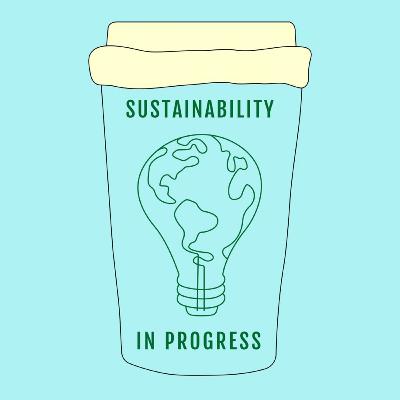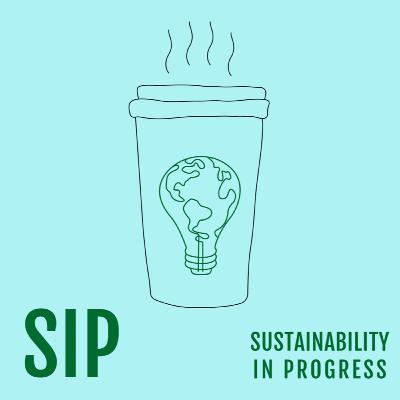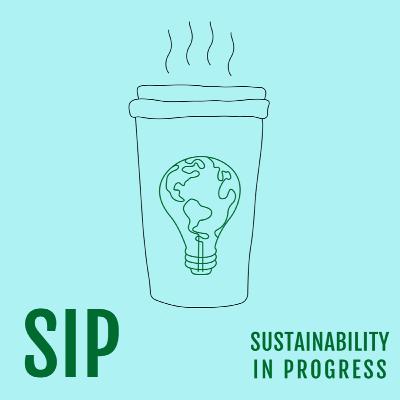Discover Sustainability In Progress (SIP)
Sustainability In Progress (SIP)

Sustainability In Progress (SIP)
Author: Sustainability in Progress (SIP)
Subscribed: 2Played: 0Subscribe
Share
© Sustainability in Progress (SIP)
Description
Welcome to Sustainability in Progress (SIP), a podcast brought to you by John George and Laura Negre, two like-minded sustainability professionals who met during their graduate program at Columbia University and look to bring sustainability education from the classroom to your devices. The sustainability space is constantly evolving, as are we, so we’ve decided to call this podcast Sustainability in Progress, or SIP. To suggest topics for future episodes, email us at sustainabilityinprogresspod@gmail.com.
16 Episodes
Reverse
New York City was once known as “the Big Oyster,” with oyster reefs playing a central role in the harbor’s ecosystem. However, overharvesting, industrialization, and pollution led to their collapse, but today, oysters are looking to make a comeback.In this episode of Sustainability in Progress, we speak with Charlotte Boesch of the Billion Oyster Project about their efforts to restore oyster reefs across New York Harbor. We discuss why oysters are a keystone species, how recycled shells from restaurants are transformed into reef habitats, and what it takes to grow and install millions of oysters in New York City's harbor.The conversation covers the science behind oyster filtration, the role reefs play in supporting biodiversity and reducing wave energy during storms, and the challenges of large-scale restoration.
The clean energy transition isn’t just about swapping fossil fuels for renewables, it’s about building a new energy system built for the future. In this episode, we speak with Tim Montague, solar developer, clean-tech advisor, and host of The Clean Power Hour. We’ll discuss the realities of the energy transition, the current state of battery storage, the growing issue of solar panel end-of-life and recycling, and the environmental footprint of mining the critical minerals needed for EVs and batteries. The conversation also tackles how AI is reshaping energy demand and grid resilience, and what it will take to build a cleaner, smarter power system for generations ahead.
From the farms that grow it to the cafés that fuel our mornings, coffee is one of the world’s most beloved and climate-vulnerable commodities. In this episode of SIP, we sit down with Etelle Higonnet, environmental advocate and founder of Coffee Watch, to unpack how rising temperatures, erratic rainfall, and shifting ecosystems are transforming global coffee production.We explore how climate change is affecting farmers’ livelihoods, what companies and policymakers are doing to adapt, and what the future of your daily cup might look like. So grab your favorite brew and join us for the conversation.Link to Coffee Watch petitions: https://coffeewatch.org/sign-petitions/
In our first episode of SIP Season 2, we chatted with David Uricoli, who spent 32 years at Ralph Lauren working on human rights and labor issues. While most of us are familiar with the environmental impacts of fashion supply chains, there is an often overlooked reality associated with the social and human impacts of apparel production. Our conversation delves into the important need for traceability, especially in regions like Xinjiang, China, where forced labor characterizes the supply chain. David helps break down the real-world challenges to social compliance as well as potential solutions to overcome these roadblocks.
Welcome back for our first episode of 2023! In this episode, Laura Negre chats with Anne Bedarf, Global Packaging Sustainability Manager at Colgate-Palmolive, about the challenges and opportunities related to the recycling system in the United States. What can governments at the federal and state level do to incentivize circular economies? What can consumers do to increase recycling rates and minimize contamination? What can industry do to scale reuse and improve recycling rates? What are the latest and most exciting innovations revolutionizing recycling? Join our discussion to hear how we can tackle these issues and how you can make your next trip to the bin more thoughtful!
Welcome back to our second episode of Sustainability in Progress, hosted by Laura Negre. For this episode, Laura sits down with Christoph Meinrenken, an associate research scientist at Columbia University’s Earth Institute, to discuss how to accurately account for total emissions across a vehicle’s lifecycle, even if they claim zero emissions at the tailpipe. For more information, please visit www.consiliencejournal.org.
In this episode, we sat with Professor Tjossem, a senior lecturer in SIPA’s Master of Public Administration program, to discuss the importance of supporting the transition to plant-based diets. This recording is brought to you by Laura Negre, Aliyah Elfar, and John George, Program Directors for Columbia University’s Journal for Sustainable Development, Consilience. Today's discussion covers whether reducing the reliance on meat and dairy products will have a meaningful impact on reducing carbon emissions, the appropriate consumer choices that are necessary in order to reduce our footprint, and a consideration of the social and environmental impacts associated with navigating this transition. For more information, please visit https://consiliencejournal.org/
Today we had the opportunity to chat with the CEO of Natoora, Franco Fubini. Franco’s recent book, In Search of the Perfect Peach, explores how flavor and seasonality could hold the key to a more sustainable food system. He argues that when we push produce out of their natural seasons, we compromise taste, nutrient density, and the environment. We have also created a food system where our produce and fruit are increasingly flat, bland, and dull, and generally uninspiring. But the solution to more flavorful, rich, and sustainable produce might be within reach!
We are joined by Etelle Higonnet, who has an incredibly storied background and today, she shares her view on how the sector can become more sustainable, address environmental and social risks, and how we as consumers can make more informed choices. She is currently founding an NGO called Coffee Watch to reform coffee industry abuses like deforestation and slavery. Her work spans a broad range of environmental issues including climate, ecological agriculture, environmental justice and forest protection, and she has also dedicated a large portion of her career to human rights. And here’s the link to the Chocolate Scorecard Etelle discusses: https://www.chocolatescorecard.com/scorecards/
Welcome to our last episode of 2024! Today we speak with Henry Gordon-Smith, Founder and CEO of Agritecture, an advisory and technology firm specializing in climate-smart agriculture. Our conversation explores the prospects for vertical farming and climate smart agriculture in reducing the environmental impacts of food systems and the role of emerging technologies in reshaping the way we feed a growing population.
In our latest episode, we are joined by the explorer Andi Cross and dive deep (pun-intended) into her adventurous journey which blends her expertise in growth strategy with a passion for ocean conservation. Hear how she’s leveraging her unique background to empower organizations on the frontlines of climate change, particularly within the ocean nonprofit sector.
From adrenaline-pumping blackwater dives to her upcoming Arctic ice dives, she shares captivating tales of exploration and the critical importance of coastal health for global communities. We also explore the double-edged sword of tourism—its economic benefits and its impact on ecosystems—and the importance of conscious exploration. We’ll also talk to Andi about how she selects her expeditions, focusing on partnerships with local stakeholders to support restoration efforts.
Join us as we dive into the climate risks and impacts of the coffee sector with our guests, Dr. Ivette Perfecto and Dr. Amanda Caudill. From exploring the effects of shade-grown cultivation to discussing innovative solutions within agroforestry, we uncover how coffee’s journey from bean to cup influences biodiversity, climate resilience, and farmer livelihoods. On the social front, the climate crisis is making a business with already-slim margins even harder to navigate for smallholders, all while premium cups seem to get more expensive, creating a puzzling disconnect. We’ll get to all these topics in detail in this conversation!
Plus, for this episode we have a fun blooper segment with a coffee taste test you won’t want to miss! Tune in to learn how you can make more sustainable choices with your daily brew.
Tune in as we dive into a dynamic discussion with Danielle Azoulay (founder of The CSO Shop) and Lindsey Coffey (activist and model) on rethinking our economic model and exploring how sustainability can drive profitability and value. Discover how you can make changes to contribute to the circular economy and why sustainable practices are not just good ethics but smart business!
In this episode, Laura chats with Jo Giessler, former Head of Global Citizenship at White & Case about the evolution of corporate sustainability over the last several years and how it has influenced the rise of ESG and Sustainable Investing. Along with its exponential growth, ESG Investing has come under scrutiny and has been forced to defend itself against claims of greenwashing amid a broader push for accountability and improved credibility in global markets. As a result, global regulatory regimes are increasingly requiring product labeling and disclosures, while the private sector and investors encourage greater transparency. As an executive who has worked in both the for-profit and nonprofit sectors, Jo’s career focused on transforming corporate culture while ensuring economic value. This background provides us with a thoughtful insider’s view into a very complex and rapidly evolving industry. Tune in to hear the conversation!
For the second part of this episode, we shifted the conversation with Jenik Radon to focus on the food supply crisis that has been driven by an increase in fertilizer prices as a result of Russia’s invasion of Ukraine. When natural gas prices rise, so do fertilizer prices, leading to increased input costs for farmers and growers worldwide. Our global food system is under an existential threat as margins and profitability diminish. Meanwhile, diplomatic and economic measures are focused on political favour in Eastern Europe. Laura Negre’s conversation with Jenik asks a crucial question: what must be done to lessen the impact on the countries hit the hardest?
For the first part of a two-part episode, we sit down with Jenik Radon to talk about the war in Ukraine and its impact on energy supply and demand. His career in sustainable development and foreign policy provides a unique perspective on the crisis and its knock-on effects globally. Jenik discusses the opportunities and challenges facing Europe in its quest to establish a sustainable energy mix and achieve greater energy independence from resource-rich superpower Russia. We also discuss the wide-ranging implications for the energy transition and countries looking to address the climate crisis. Join our discussion to. Tune in to hear Jenik's thoughts on the current state of affairs and his easy-to-understand take on a very complex geopolitical crisis.







